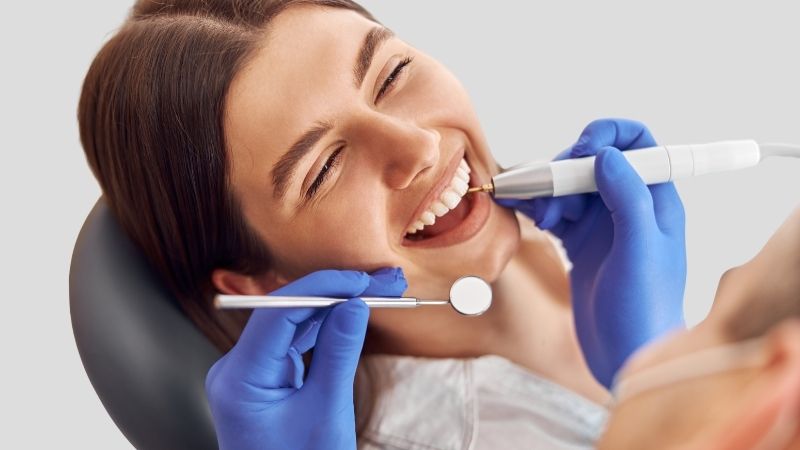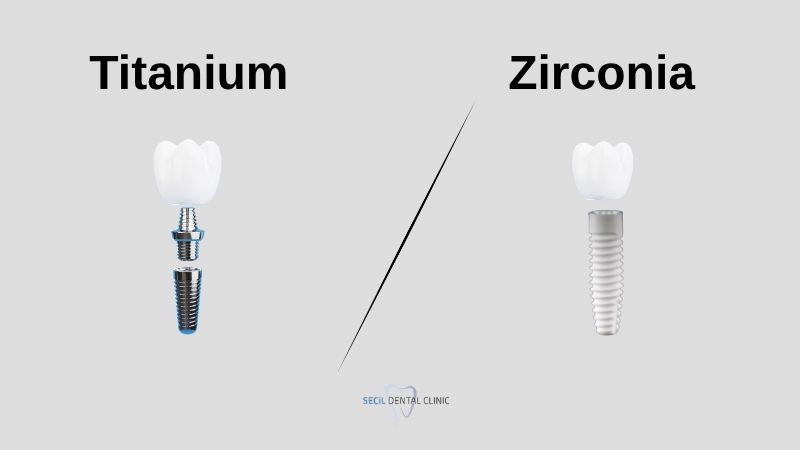
CONTENTS
Titanium and zirconium implants both ensure that the artificial tooth is firmly attached to the jaw. There are only some differences, such as differences in durability and materials.
Here's a quick look to help you decide:

It's a metal-free dental implant made from zirconium dioxide, a super-strong white ceramic. Dentists use zirconia implants to replace missing tooth roots, just like a titanium implant. It is used to support a dental crown. They are fixed into the jawbone.
Zirconia implants look natural. They don't cause any grey shadows. No metal peeking through.
It is getting more popular. Especially in cosmetic and holistic dentistry. It's seriously durable. So, dentists use them in especially chewing teeth.
Zirconium implants are widely used in modern dentistry. They stand out with their white color, tissue-friendly structure, and aesthetic appeal. As with any treatment, they have both positive sides and certain limitations.
Zirconia implants look just like natural teeth roots. Their white colour blends in with your gums, so there's no metal shadow. That's one big reason people love them, especially for front teeth. They're also kind to your body. No metal, no allergic reactions. And bacteria don't stick as easily, which helps keep gums healthier over time. Zirconia implants are made to handle chewing, biting, and smiling without backing down. If you care about aesthetics and clean materials, zirconia is a safe and elegant choice.
But no material is perfect. For starters, they're usually one-piece, which means you can't separate the implant from the abutment. That makes certain procedures, like angling the crown or correcting position, harder.
Also, zirconia doesn't integrate with bone as quickly as titanium in some patients. Osseointegration takes longer or is less predictable in complex cases. That affects stability early on.
Another drawback: if it chips or cracks, it can't be repaired. Unlike titanium, there's no bending or adjusting. It breaks; it's done.

Titanium implants are metal screws placed into the jawbone to replace missing tooth roots. They act like anchors and hold crowns, bridges, or dentures firmly in place.
Why titanium? Because it bonds with bone really well. It's light but strong, and your body usually accepts it without trouble. No rust, no reactions. That's why it's been the go-to material for over 40 years.
Many last 20 years or more with good care.
Titanium implants are like the foundation of a building. You don't see them, but everything depends on them. They don't need to look pretty. They just need to last, and they do.
Titanium implants have been used in dentistry for over 50 years and not just because they're 'old-school'. They've earned their reputation. Strong, reliable, and time-tested. But like every choice, they come with both bright sides and small risks.
Titanium fuses with your bone like it belongs there. That natural bond called osseointegration creates a stable, solid foundation for your new tooth. Once it heals, it feels like part of your body.
It's built to last. We're talking 20 years, 30 years, sometimes even a lifetime. And it doesn't break under pressure. Heavy chewing? No problem.
Titanium is also flexible in design. Most implants come in two parts, so your dentist can adjust the angle or fit to match your jaw perfectly.
Worried about safety? No need. Titanium is biocompatible. That means your body sees it and says, 'You're fine here.' It doesn't rust, it doesn't corrode, and it rarely causes reactions.
In short: it's strong, smart, and trusted. Kind of like the quiet friend who always shows up and never lets you down.
Now, titanium isn't for everyone. At the end of the day, it's still metal. And some people just don't want anything metallic in their body, especially those leaning toward holistic or allergy-sensitive approaches.
In rare cases, if your gums are thin or pull back over time, the grey colour underneath can show a little. It doesn't hurt anything, but it might not look perfect in the front of your smile.
What if the body rejects it? It's rare, but it can happen. A small number of patients may develop inflammation or sensitivity. And if oral hygiene isn't great, bacteria can sneak in and affect the surrounding bone.
Titanium does its job quietly and well. It's not flashy. It's not trendy. But it works, and it keeps working. For many, that's exactly what matters.
No, titanium implants don't cause cancer. This fear usually comes from the idea that tiny titanium particles might harm cells. There's no scientific proof linking titanium implants to cancer.
Titanium is actually one of the safest materials in medicine. It doesn't rust, it doesn't break down, and your body accepts it well. That's why doctors use it in bones, joints, even heart valves.
Think of it like this: being scared of titanium causing cancer is like thinking your car's seatbelt might strangle you. It's there to help not hurt.
So no, you don't need to worry. If anything, you can feel safe knowing titanium has been trusted for decades.
Just strong, stable, and safe.
Zirconia is often known the healthiest implant. Why? Because it's metal-free, white like natural teeth, and doesn't trigger allergies or inflammation.
Titanium is still the most used, it's strong, reliable, and backed by decades of research. But zirconia wins in terms of being bioinert and aesthetic.
Metal or ceramic?
For health, zirconia. For strength, titanium.
Best choice! It depends on your needs, but both are safe when done right.
|
Feature |
Titanium |
Zirconia |
|
Material |
Metal |
Ceramic |
|
Color |
Grey |
White |
|
Strength |
Very high |
High |
|
Biocompatibility |
Excellent |
Outstanding |
|
Allergy risk |
Low |
None |
|
Heat conductivity |
Yes |
No |
|
Aesthetics |
Moderate |
Excellent |
|
Longevity |
30+ years |
10–15+ years |
|
Clinical history |
50+ years |
10–15 years |
|
Cost |
More affordable |
More expensive |
Titanium is the classic choice strong, long-lasting, and trusted for decades. It bonds well with bone and works great even under heavy chewing.
Zirconia is the newer, metal-free option. It looks more natural (because it's white), is great for people with metal sensitivities, and doesn't conduct heat or electricity.
Need strength? Titanium.
Want a metal-free, natural look? Zirconia.
Both are excellent, just different. The best one? It depends on your mouth, your health, and your priorities.
Because your smile deserves more than just treatment, it deserves precision, care, and trust. At Seçil Dental Clinic, we blend modern technology with a warm, expert touch to give you results that not only look natural but feel right.
Let's create your perfect smile and contact us.
Make An Appointment Today With Our Online Form